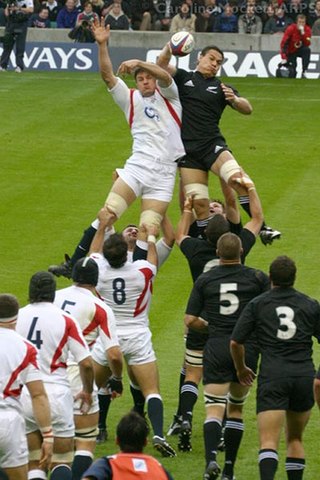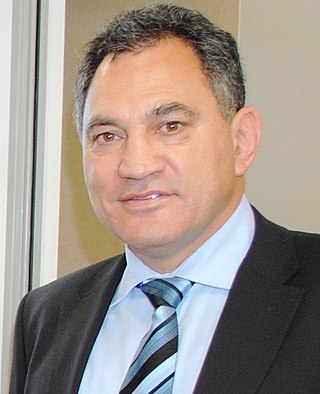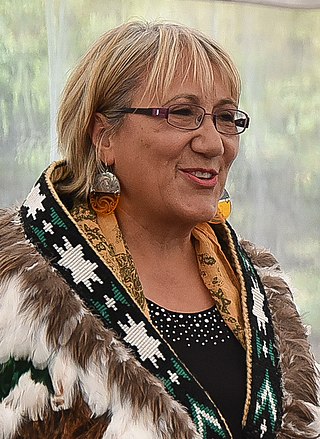Related Research Articles

Whanganui, also spelt Wanganui, is a city in the Manawatū-Whanganui region of New Zealand. The city is located on the west coast of the North Island at the mouth of the Whanganui River, New Zealand's longest navigable waterway. Whanganui is the 19th most-populous urban area in New Zealand and the second-most-populous in Manawatū-Whanganui, with a population of 42,500 as of June 2024.

New Zealand Rugby (NZR) is the governing body of rugby union in New Zealand. It was founded in 1892 as the New Zealand Rugby Football Union (NZRFU), 12 years after the first provincial unions in New Zealand. In 1949 it became an affiliate to the International Rugby Football Board, now known as World Rugby, the governing body of rugby union for the world. It dropped the word "Football" from its name in 2006. The brand name New Zealand Rugby was adopted in 2013. Officially, it is an incorporated society with the name New Zealand Rugby Union Incorporated.

Te Aute College is a school in the Hawke's Bay region of New Zealand. It opened in 1854 with twelve pupils under Samuel Williams, an Anglican missionary, and nephew and son-in-law of Bishop William Williams. It has a strong Māori character.
The following lists events that happened during 1937 in New Zealand.
The following lists events that happened during 1949 in New Zealand.

Rugby union has been played in New Zealand since 1870 and is the most popular sport in the country as well as being its national sport. In a 2023 survey, 75% of respondents said they followed the sport.

The Manawatu Rugby Football Union (MRU) serves as the governing body of the sport of rugby union in the Manawatū-Whanganui region of New Zealand.

The Whanganui Rugby Football Union (WRFU) is the governing body for rugby union in the Whanganui region of New Zealand. The Whanganui Rugby Football Union was formed in 1888.
The King Country Rugby Football Union is a constituent union in the New Zealand Rugby Union. It is located in the central North Island of New Zealand in an area known as the King Country. It was formed in 1922 when the South Auckland Rugby Union was split into three.

The Buller Rugby Union (BRU) is a rugby union province based in the town of Westport, New Zealand. The Buller provincial boundary also includes other notable towns such as Reefton, Karamea, Granity, Charleston, Punakaiki and Murchison.
Southern Cross Campus is a composite school that caters for students in Years 1–13 in the suburb of Māngere East in Auckland, New Zealand. The school has deep ties to the Mangere East community by providing education, facilities, and programmes for the wider use of the whole school. It is a Māori and Pacific Islands ethnic school, with students of European (Pākehā), Asian, and other ethnicities as a 0.5% minority.

Rotorua Boys' High School (RBHS) is a state school educating boys from Year 9 to Year 13. It is situated just outside the Rotorua CBD at the intersection of Old Taupo Road and Pukuatua Street in Rotorua, New Zealand. The school is governed by an elected School Board, of which the Principal is ex officio a member under guidelines laid down by the New Zealand Ministry of Education. With Māori enrolment exceeding 75% of the school’s intake, the largest per capita in New Zealand, RBHS has been a longstanding recipient of funding from its Ngāti Whakaue endowment that assisted the construction of the school’s 104-bed hostel, and the purchase of a computer laboratory. RBHS is noted for its performance in sport, with 4 Olympians among its notable alumni, and for having won the Prime Minister of New Zealand Supreme Award for Excellence in Education and the Excellence in Leading Award, making it the top school in the country for 2019. Its retiring principal, Chris Grinter, was the longest serving in the school's history, and in 2022, he received a New Zealand Order of Merit for services to education and Māori.
Glen Matthew Osborne is a New Zealand television presenter, former rugby union player and current Police Constable for the New Zealand Police.

Bernard Paul Quinn is a New Zealand businessman, former rugby union player and former politician. He captained the Wellington Rugby Football Union team from 1981 to 1983 and the New Zealand Māori national team from 1980 to 1982. From 2008 to 2011, he was a Member of the New Zealand House of Representatives for the National Party.

Rugby union in New Zealand is structured into four tiers. The top tier is composed of the national representative teams, with the men's team – known as the All Blacks – and the women's team – known as the Black Ferns, at the top, followed by other representative sides such as the Junior All Blacks and Māori All Blacks. These national sides are administered by the New Zealand Rugby Union (NZRU). Below this level is Super Rugby, where there are five New Zealand sides, each representing a different region of the country. Below this level is provincial rugby, the third tier – each province has a representative side that plays in either the semi-professional Bunnings NPC, or amateur Heartland Championship. These provincial sides are selected of Super Rugby players, and club players from within the province. Club rugby is the fourth and lowest tier, and consists of clubs competing in local leagues organised by a provincial union.
Ihakara Porutu "Kara" Puketapu was a New Zealand public servant and Māori leader. He served as Secretary of Maori Affairs and was later chair of Te Āti Awa based in Waiwhetū, Lower Hutt.

Mavis Raylene Mullins is a New Zealand businesswoman. She is Māori and identifies with Rangitāne, Te Atihaunui-a-Paparangi and Ngāti Ranginui iwi.

Edward Te Rangihiwinui Tauroa, known as Hiwi Tauroa, was a New Zealand rugby union player and coach, school principal, and civil servant of Māori descent.

Robert James Campbell, is a New Zealand socialist, economist, trade unionist, businessman and public servant. He has chaired several organisations and institutions including Resistance Bookshop, the Distribution Worker's Federation, Federation of Labour, Guinness Peat Group (GPG), SkyCity, Summerset Holdings, Tourism Holdings, Te Whatu Ora, and the Environmental Protection Authority (EPA). He has also served as Chancellor of Auckland University of Technology since 2019.
The 2021 Heartland Championship, was the 15th edition of the Heartland Championship, a rugby union competition involving the twelve amateur provincial unions in New Zealand. There was no Heartland Championship held in 2020 due to the COVID-19 restrictions.
References
- ↑ Luxford, Bob. "Bill Osborne". New Zealand Rugby Union. Retrieved 12 January 2015.
- ↑ "From All Black to business supremo". 3 September 2023.
- ↑ "The winning strategies of New Zealand's rugby All Blacks | McKinsey".
- ↑ "Media Release | Bill Osborne Appointed Chair of Chiefs Rugby Board".
- ↑ "Bunnings Warehouse Heartland Championship introduces the Bill Osborne Taonga and Ian Kirkpatrick Medal - RUGBY HEARTLAND". 11 November 2021.